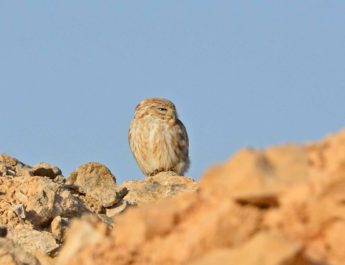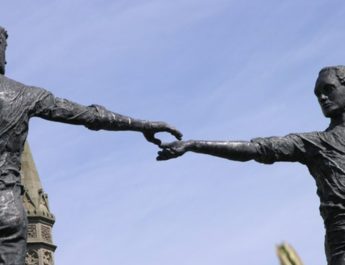Psalm 145:13-21
Narrative Lectionary 440
13 Your kingdomA is an everlastingB kingdom,
and your dominionC endures throughout allD generations.E
The Lord is faithful in all his words,
and gracious in all his deeds.
A “kingdom” = malkut. From melek (king, royal). This is royalty, kingdom, realm, empire – the power the sovereign has.
B “everlasting” = kol + olam. Kol is from kalal (to complete). This is all or every. Olam is a long scope of time whether in the past (antiquity, ancient time) or in the future (eternal, everlasting).
C “dominion” = memshalah. 14x in OT. From mimshal (dominion, ruler, authority); from mashal (to rule, reign, govern, have authority, wield). This is to rule, govern, a ream, ruler, authority, dominion, forces.
D “all” = kol. Same as “everlasting” in v13. See note B above.
E “generations” = dor + dor. Literally, “generation and generation.” From dur (to move in a circle, which implies living somewhere or remaining there; it can also be the sense of piling or heaping up). This is a revolution of time, which is to say, an age or generation. It can also be a dwelling or one’s posterity.
14 The LordF upholdsG all who are falling,H
and raises upI all who are bowed down.J
F “Lord” = YHVH. From havah (to be, become) or hayah (to come to pass, become, be). This is the name of the God of Israel, the self-existent and eternal one, the tetragrammaton. This pronunciation has been lost to time so “Lord” is generally used in its place.
G “upholds” = samak. This is to lean, rest, support, brace, uphold, sustain, or establish. It is to lean on in a positive or negative sense.
H “falling” = naphal. This is to fall, whether by accident, to fall prostrate, or to fall in violent death. Figuratively, it can refer to personal ruin or calamity, a city falling, an attack or a falling away. It can also be a deep sleep or wasting away.
I “raises up” = zaqaph. 2x in OT. This is to raise or lift up. Figuratively, it can mean to comfort.
J “bowed down” = kaphaph. 5x in OT. This is to bend, bow, or curve. It is used for bowed down (as in oppressed), a bulrush bowing, and bowing before God.
15 The eyesK of all lookL to you,
and you giveM them their foodN in due season.O
K “eyes” = ayin. This is eye in a literal or figurative sense so eye, appearance, favor, or a fountain (the eye of the landscape).
L “look” = sabar. 8x in OT. This is to look, inspect, wait. It can imply watching for in a hopeful and patient manner.
M “give” = natan. This is to give, put, set, offer. It is to give literally or figuratively.
N “food” = okel. From akal (to eat, devour, burn up, or otherwise consume; eating in a literal or figurative sense). This is food, supply of provisions, the act of eating, or the time when one eats.
O “due season” = et. Probably from anah (to answer, sing, announce); from ad (forever, all, old); from adah (to pass on, advance, decorate oneself). This is a period or season. It can also mean whenever or continually.
16 You openP your hand,Q
satisfyingR the desireS of everyT living thing.U
P “open” = pathach. This is to open wide in a literal or figurative sense. So, it is open, draw out, let something go free, break forth. It can also mean to plow, engrave, or carve.
Q “hand” = yad. This is hand, ability, power. Hand in a literal sense, but also what one can do or the means by which one does it.
R “satisfying” = saba. To be satisfied or full in a literal or figurative sense. Also, to have plenty of.
S “desire” = ratson. From ratsah (to be pleased with, delight, take pleasure in, or accept with favor; to approve or consent regarding something; can be used specifically of satisfying debts or being pardoned). This is delight shown in favor, good will, something that is accepted or acceptable.
T “every” = kol. Same as “everlasting” in v13. See note B above.
U “living thing” = chay. From chayah (to live or keep alive literally or figuratively). This is alive, living, lifetime. It can also be used to describe someone’s age. It can refer to animals, plants, water, or a company or congregation of people. It is life in a very broad sense.
17 The Lord is justV in all his ways,W
and kindX in all his doings.Y
V “just” = tsaddiq. From the same as tsedeq (rightness, righteousness, just cause, vindication; that which is right in a natural, moral, or legal sense; abstractly equity; figuratively prosperity). This is just, innocent, righteous, righteous one, or lawful.
W “ways” = derek. From darak (to tread, march, to walk. Can also mean affixing a string to a box since one needs to step on it to bend it in the process; so also an archer). This is a road as a thing that is walked on. Can be used figuratively for the path that one’s life takes or how one chooses to live one’s life.
X “kind” = chasid. From chasad (being good, kind, merciful; may mean bowing one’s neck as is done in the presence of an equal for courtesy’s sake; so, if one in a superior position is treating you like an equal, that is what is captured here). This is faithful, kind, pious, merciful, or gracious. It can also refer to godly or pious people. This is where Chasidic Jews take their name from.
Y “doings” = maaseh. From asah (to do, make, accomplish, become). This is a word – any action whether positive or negative. It can also be a transaction, construction, activity, property, or something that is produced.
18 The Lord is nearZ to all who call onAA him,
to all who call on him in truth.BB
Z “near” = qarob. From qarab (to come near, offer, make ready). This is near whether nearby, related, near in time, or allied.
AA “call on” = qara. This is to call or call out – to call someone by name. Also used more broadly for calling forth.
BB “truth” = emet. From aman (to believe, endure, fulfill, confirm, support, be faithful, put one’s trust in, be steadfast. Figuratively, this is to be firm, steadfast, or faithful, trusting, believing, being permanent, morally solid). This is firmness or stability. Figuratively, it is faithfulness, truth, or trustworthiness. This is the same root that “amen” comes from.
19 He fulfillsCC the desire of all who fearDD him;
he also hearsEE their cry,FF and savesGG them.
CC “fulfills” = asah. Related to “doings” in v17. See note Y above.
DD “fear” = yare. From the same as yare (to fear, be afraid, dreadful; also fearful reverence – to fear in a moral sense is to say to revere, respect). This is fearful or morally reverent.
EE “hears” = shama. This is to hear, call, consent, or consider. It implies listening intelligently, giving attention, and, because of these two factors, obedience and action are often implied.
FF “cry” = shavah. 11x in OT. From shava (crying or shouting aloud; seeking freedom from some kind of trouble). This is cry, cry for help.
GG “saves” = yasha. To deliver, defend, help, preserve, rescue, be safe. Properly, to be open, wide or free, which implies being safe. Used causatively, it means to free.
20 The Lord watches overHH all who loveII him,
but all the wickedJJ he will destroy.KK
21 My mouthLL will speakMM the praiseNN of the Lord,
HH “watches over” = shamar. This is to keep, watch, or preserve. It means to guard something or to protect it as a thorny hedge protects something.
II “love” = aheb. This is to love, beloved, friend. It is to have affection for sexually or otherwise.
JJ “wicked” = rasha. This is morally wrong so it refers to someone who is actively bad as wicked, criminal, an evil person, offender, condemned, or ungodly.
KK “destroy” = shamad. This is to demolish, destroy, perish, overthrow, pluck down.
LL “mouth” = peh. This is mouth in a literal or figurative sense. So, more literally, it can be beak or jaws. More figuratively, it refers to speech, commands, or promises.
MM “speak” = dabar. This is generally to speak, answer, declare, or command. It might mean to arrange and so to speak in a figurative sense as arranging words.
NN “praise” = tehillah. From halal (to praise, be boastful). This is praise or a song of praise. It is to offer God a hymn, to boast in God. This shares a root with “hallelujah.”
and all fleshOO will blessPP his holyQQ nameRR foreverSS and ever.TT
OO “flesh” = basar. From basar (being a messenger, publish, carry preach; properly, this is being fresh, rosy or cheerful as one bearing news). This is flesh, the body, fat, skin, self, nakedness, humankind, or kin. It can also refer to private parts.
PP “bless” = barak. This is to kneel, to bless. It is blessing God as part of worship and adoration or blessing humans to help them. It can be used as a euphemism to say curse God.
QQ “holy” = qodesh. This is set apart and so sacred. God is different from us and so God is holy/set apart. Things we dedicate to God’s service are set apart for God and so they, too, are holy, etc.
RR “name” = shem. May be from sum (to put, place, set). This is name, fame, renown. A name was thought to indicate something essential about a person – something about their individuality. So, this word can also mean honor, authority, or character.
SS “forever” = olam. Same as “everlasting” in v13. See note B above.
TT “ever” = ad. Related to “due season” in v15. From adah (see note O above). This is old, perpetuity, eternity. It is a duration going back or forward.
Image credit: “Sausage Dog in Chile” by Parisdg, 2012.




